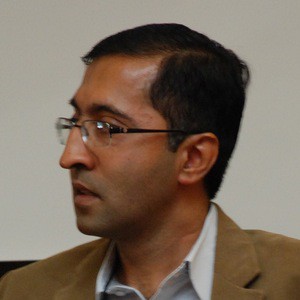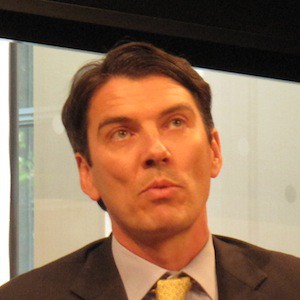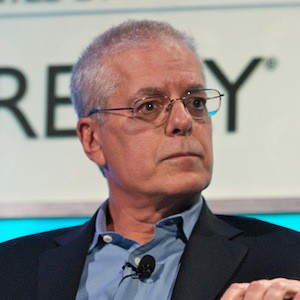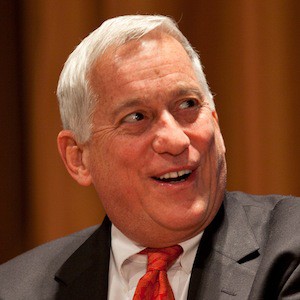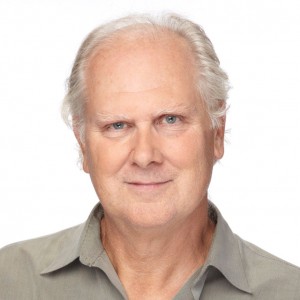Martin: We’re here with Eric Schmidt at Google on April 1, 2013. Eric, we’ve talked to quite a few people, but most of the folks we’ve talked to Arthur Sulzberger, Don Graham came to this collision through journalism. They were journalists first or they were running or part of journalistic organizations first and then digital came upon them. You came to it from a very, very different place. You were one of the first employees at Sun and then CEO of Novell and of course CEO of Google. When did it first occur to you that the technology was really going to have a profound impact on journalism?
Eric: I think when Google News was invented. It was the first time we saw that a simple tool that could literally aggregate common stories could be so useful and that people would be so worried about it. Because everyone saw the same thing, which was that a lot of news gathering was really aggregation. It wasn’t the hardcore reporting that we always celebrate.
Martin: OK. Google News happens and the next thing that begins to occur is that there’s a schism in the thinking of the industry. On the one side are folks who are very open to Google News and open to the idea of aggregation. On the other, and I won’t mention any names…
John: Well you were one of those.
Martin: And I was one of those, right. But there are folks who believe that you’re fundamentally violating if not violating copyright, certainly extending the spirit of fair use. Can you just comment on that schism and how…
Eric: On the legal matter, this has been tested many times and we were clearly on the right. Our argument about Google News at the time, which is still true, is that we send a great deal of traffic to the websites. We don’t ourselves make copies of the stuff. We actually take the customer who’s on Google anyway and we send them to your site. The problem of course is that when the customer comes to your site you don’t necessarily get the same amount of money that you did when they purchased your print subscription or your print newspaper. But the fact of the matter is there’s both a legal principle but also as a traffic outcome we were pretty happy with we were doing. We thought that we were helping newspapers.
Martin: And in part you were also helping to monetize the traffic as well.
Eric: But our monetization on Google News was essentially zero. We did in fact have a set of advertising products that you could use as a newspaper, indeed the New York Times and others did that. But the fact of the matter is, we were helped by the fact that we never got around to running ads against Google News. Because no one could say well we were somehow making money from Google News, because we were not.
Martin: Right, yeah.
John: Google is obviously about a lot of things other than news. You have many other interests and strategic matters of importance. Long before Google News you surely realized that the business model around traditional journalism was being disrupted by advertising issues, which they had been built around. Was Google News in any way because if you take the view that Google News can be very benign to the news business, was it in any way a reaction to that? Or was it strictly aimed at the consumer?
Eric: Google News was a simple, straightforward innovation. A particular engineer on his own decided to write a product that would aggregate news and organize it this way. To give you an example of how new this was, I remember giving a presentation about it as we announced it at Northwestern in Chicago. Afterward one of the questions was, what bias does your newspaper have? I said, none. It’s computers. But I thought to check and I went back to the office and I sat down with the engineer and I said, “I just want to make sure that there’s no bias, no liberal or political bias,” and he said, “No, none of that.” Engineers have a way of answering questions precisely where you know they’re not completely covering the answer. So I suspected, are there any other kind of biases? And he said, “Yes,” and I said, “What?” “Cricket.” I said, “Cricket?” and he said, “Yes. I love cricket.” I said, “You put in a boost for cricket in Google News,” he said, “Absolutely.” That explains why we saw so many cricket stories. We have since fixed that.
John: Could we back just a little bit before we get too deeply into the whole issue of news, just go back to your beginnings at Google and what the business model was when you arrived, what you found, and how it progressed through the whole paid search advertising part of the business.
Eric: Google today is pretty much the same as it has been since I’ve been here. Since 2001 the majority, 97, 98% of our revenue comes from ads of one kind or another. These little ads that come along with our search results which are targeted to what you were looking for, people auction and people click on them and we make a lot of money from that and we do it globally and it works extremely well. That’s not changed very much and I don’t think it will change very much in the next while.
Martin: OK. Do you mind if I go back to Google News?
John: No, no.
Martin: OK. Let’s fast forward three or four years, maybe a little longer than that, five years. It’s now 2006 or ‘7 and I look, I don’t want to ascribe any reason or motivation for your having come visited us at the Times, but I got the sense that you at that point did realize that either Google could be helpful in moving the digital journalism world along, or you felt that there was some problem with the business model that you could be helpful with. What motivated that series of interactions?
Eric: After Google went public Google News became quite successful from a traffic perspective and there was a lot of press coverage about how Google was going to take over whole industries. Many fears, largely unfounded in my view. But we did an analysis at that point about the structure of the industry, what was possible, what we should do. It was pretty clear to me that there was going to be a problem. It was by then that I began to understand that the core problems of the news industry, which have to do with declining circulation, classifieds, lack of value in the print advertising. The things that are now well established.
A few of us talked about how we could fix this. The idea was to partner more closely with the leading institutions to try to figure out how to get better monetization, better discussion and so forth. I’m not sure it was particularly successful but it was an attempt by me and others to build bridges.
I remember giving a series of speeches including one essentially at a newspapers’ association where I gave a speech and I was followed by the person who attacked us unmercilessly. The tension between Google and the newspaper industry was extremely high because the newspaper industry, in my view incorrectly, saw us as causing all of their problems.
I should say, by the way, that is the typical reaction to an established industry in favor of innovation. If you study innovation, this cycle where the first one is denial, the second one is lawsuits, the third one is acceptance, and then the fourth one is figuring out how to deal with the future, is a common cycle in technology driven innovation.
Martin: Where are we now? Not to fast forward too far because we have a lot of ground to cover but you brought it up.
Eric: The single best thing that’s occurred was the announcement of the iPad and then the competitor products that are Android tablets and the perception within the industry that you could make money on tablets. It’s important to remember that in 2006, 2007 iPad did not exist. Mobile phones in the form of the iPhone were just coming out and people were talking about it by 2008. When the iPad and then its successors came along the newspaper industry finally saw a device that they could actually do what they would like to do on it, which is to sell very high quality information and charge for it. I would, at that point, use that as an example not only in our defense, but also to try to explain to people that there is a future. It is being painted in front of you. You need to get your act together.
Martin: I want to explore. I remember, about the same time that you came to see us, Marisa was talking about the living story. The notion there was that all of the content that was being created for newspaper websites, much of it, was essentially being re purposed from print publications. I think the point that she was trying to make is that Internet, web based media have their own character. First of all, do you agree with that? Do you think that the industry hasn’t innovated enough, in terms of the actual construction of the story? If so, why do you think that has happened?
Eric: I think there’s a very simple explanation. The industry has no engineers.
Martin: That’s because you hire them all Eric. [laughs] I won’t editorialize but we can’t hire.
John: Well it’s not the first time that it’s been suggested that it meant…
Eric: I am just laying out the facts. You cannot innovate and build new products without engineers in your field. If you don’t have them, you have to find somebody who does and partner with them in some clever way.
John: You have to be committed to investing in them.
Eric: The fact of the matter is that the industry, which is under extreme financial pressure, was unable to do that. I’m sure many people, including yourself, wanted to do this but you were unable to do it. For whatever reasons, you could not do it. You cannot build new products without engineers. So in the case of the living story, for example, an idea that Marisa pushed which I liked a lot. We did various demonstrations about how to do that. There are engineers.
To continue the timeline, it’s actually important to say that I think we roughly know what the future’s going to look like. That future will be what you think of as newspapers largely on very sophisticated tablets in the future. With very sophisticated knowledge mechanisms to see what you know, what you’ve already read, you’re logged in and so forth. With very sophisticated advertising products.
Those products are not going to be made by the newspaper companies. They’re going to be made by new entrepreneurs who will build those products on top of the tablets and other things. There’ll be some kind of way in which the revenue is shared.
John: Is it largely an open question who’s likely to own those products that you describe?
Eric: If you think about newspapers and the other companies, they were always a compromise between editorial and distribution. The writers are very, very talented and extraordinarily great at what they do, the reporters and so forth. That function will continue. The core problem that the Internet has is it has attacked, if you will, the union of the distribution and the editorial. In the same way that the major media companies have the problem that they do a tremendous amount of work but they also have captive distribution channels. Those captive distribution channels, which primarily include cable and cable feeds, all of those things are being disrupted by the fact that people are online all the time. They’re not consuming it through the same channels. It is the same problem and we will see.
The fact of the matter is that the engineers are going to have to get paid. There will be a new set of start ups, of which there is a number that have come out, which attempt to do news reading and news aggregation. Maybe some of them will ultimately become the dominate players there.
John: Have you seen any? Go ahead.
Martin: I just want to go down this engineering route a little bit because I think that, sitting here in 2013, some newspaper companies really have developed modest, I’d call them, engineering capability. The question for me at this stage is what is the relationship of the engineering side to the editorial side? Let’s just talk about the product function that’s kind of in the middle. These are very editorially driven operations. In your view, should the engineering side be running product in support of…? How, in your conception, would the engineering side interact with the editorial side? I guess that’s the simplest way to ask the question.
Eric: Well, this is not how engineers think, because engineers always think they’re in charge. A reasonable answer is that engineers are going to try to build a great platform and some set of editorial people will appreciate how tremendous the authoring environment is. How amazing the navigation is. There’s a deeper problem on the engineering side. We know how to do navigation and aggregation extremely well. If you look at the monetization, it’s not as good as the model that it’s replacing. This is a core problem. The general term in the industry is we’re going from analog dollars to cents.
As long as that transition is occurring with deletion of revenue, it’s a huge problem for the existing institutions. It’s a problem for music. It’s a problem for movies. It’s a problem for video. It’s a problem for newspapers. It’s a problem of all media.
There are some countries where this is not true. Germany, for example, makes money and the British newspapers make money. For example, the French ones are under great pressure. We put together a program to try to help them. Here in the U.S. they’re under great pressure. There’s evidence that employment has decreased by 30% from its high. Circulation has been declining a couple percent every year for roughly 15 or 20 years.
So these are sort of core business problems that are not going to go away anywhere soon.
John: So there are a lot of myths that have surrounded this passage. Some of them around central issues like paid content versus free content. The concept of original sin, of which some people accuse Martin and me. An original sinner for pushing to give away the New York Times content for free. Is there anything, in your view, that could have made any significant difference? Not to an individual company, but to the…
Eric: Most of the arguments that I’ve heard are based on emotion, not rational analysis. So it’s helpful to start doing the math. The fact of the matter is that in an always connected world, the audience of three, four, five billion, they’re not going to be paywall subscribers. If they’re going to see your content, they’re going to do it for free. You’ll have to come up with an advertising model that supports that. Ideally, working with Google and others. As we develop better advertising models, better targeted, there will be more money in that space. If your goal, as an editorial institution, is to cover everyone it’s not going to be paywall based. It’s important that this is your decision, not anyone else’s. You’ve got a choice of whether you want to use a paywall or not.
A reasonable prediction is organizations who had good subscription models, which include all of the major media institutions, will substitute those for paywalls. It’s a reasonable presumption.
Why? They have strong subscribers. They understand how to run that business. It’s consistent with their model and a good choice. So over the last few years, Google has offered a series of products, especially in the last year, that allow you to make very straightforward pay walls.
We make it easy for the money to work. That’s a good step. But I would offer two examples, in the United States of companies which were new, Politico and Huffington Post, which ultimately chose a free model. They chose a free model supported by advertising. One way to phrase the disruption problem is, the real disruption that’s going on is over the newspaper subscription.
Historically, companies fail to move from one economic model to another. A reasonable presumption, and with success, by the way, is that the media companies will largely be pay wall based. Again, Rupert Murdoch famously talked about this as the only answer and was way out in front. And probably for the right reasons.
Because he had a strong model. He understood what he was doing. But that’s not going to reach five billion people. It’s not going to happen.
John: I follow the logic of your argument. The two examples you gave, Politico and HuffPo, there is some skepticism, even in your own ranks, with people we’ve talked to today, of just how profitable those models ultimately are.
Eric: All I can say is we have two examples of companies which are doing well. In Huffington Post, they created a value that was reportedly at least $300 million of value. That would seem to be real money. Congratulations to Arianna. With the Politico folks, they use a hybrid model, as well as they have various things involving television.
John: They even have print.
Eric: They have limited print. To me, both of those are examples of entrepreneurship in an industry which has had essentially none. Just to hammer on this question about the way innovation works, entrepreneurs always come out of left field. They always come from the place you don’t expect. They always see the world a little bit differently. What’s happening in the media industry is those entrepreneurs are reinventing it. It doesn’t mean that the existing institutions are wrong or so forth. But it does present a competitive business challenge to those that people need to respond to.
John: There’s no questionable, whether they’re profitable or not, that they’re successful disruptors. They have successfully disrupted the business model.
Eric: It’s easier if I give it to you in a historical context. The problem, in 2008 and 2009, when I came to visit The New York Times, is we didn’t have tablets. We didn’t have Huffington Post. We did not have Politico as examples. We had no examples. So there was a period of time, between 2005 and 2008, where the Internet was ascendant, Google was ascendant. These models were beginning to come out. But the entrepreneurs had not built the alternatives yet. Today, when my friends in the media industry talk to me about these things, I simply point out these examples. I say, “These are examples that you can learn from.” Indeed they are.
John: Could you walk us through the history of not only Google, but some of the aggregators? The history of your skirmishes with the established media industry, over fair use and copyright? How that evolved for you and where you think it is today. Is that settled law and settled issue?
Eric: I’m not enough of an expert on these matters to give you the exact, full answer. I can tell you that, in The United States, there are no issues, with respect to fair use and what we’re doing now. We’ve had a set of trademark fights, which we win. The US law is very settled.
John: So Europe, that’s hotter?
Eric: In Europe, the copyright laws are different. The fair use laws are different. But so far, we’ve been winning pretty much everything there too.
John: Can you just go back. Not looking at it so much from a legal point of view, but from a cultural point of view. Because it speaks to the same point you’ve been making about denial, lawsuits and then…
Eric: Acceptance and innovation.
John: That was a big part of the process here, around that issue as well, right? Or was it just shock, denial?
Eric: I’ll let others speak, as to their reactions. From our perspective, what we did is, we provided a tremendous services to end users. That service was used by many millions of people and we sent lots of traffic to the newspapers.
Martin: Looking forward a little bit, can you talk about Google Now and what you think that portends? It seems to me to be a very direct and relevant engine for all kinds of content, not just traditional journalism. It seems like it could be an avenue for a certain kind of journalistic content, as well.
Eric: It’s too early to know how Google Now will be shaped by the technology. Right now, what Google Now does is, it attempts to show you what it thinks is relevant to you, using some new artificial intelligence techniques that Google has adopted. It’s highly personalized. You need to opt in. You need to tell it to do its thing. For example, it has figure out where my home is, where my office is. It tells me how long, it gets me from the home to the office. Useful things like that. We’ll see how broadly such targeting is useful. There’s evidence that, properly done, AI technique could not only give me information that’s reverent, but could also give me things which are relevant about the future. We’ve seen a pattern that, when there’s a problem in India, we see the same pattern two days later, so we’re giving you a heads up.
You could imagine those kinds of scenarios, eventually.
Martin: There’s an evolving landscape, where you have these hyper personalized services, coupled with social curation. Where a lot of the valuable stuff I get now, I get from services like news.me and Twitter. These are more serendipitous. Let me just put it that way.
Eric: It’s worth looking at a spectrum. Let’s start with the classic newspaper, which is highly curated. The benefit of that newspaper, and I love newspapers and read them in print, not even on tablets. I’m actually a real subscriber. When you finish the paper, you have a great satisfaction of knowing that you know all you’re supposed to know. If you read the paper religiously, you have a real sense of what’s going on globally. For people who are curious and have a fixed amount of time, especially if they’re commuting, in transit, on an airplane, they’re great. There’s another generation of people who get most of their news from, let’s just call it Twitter. This behavior does not make a lot of sense to me, as a person.
But I know it makes a lot of sense to them. What they do is, they’re scanning all the time. They follow a certain set of people who are following other things. Think of that as an expansion of a network. That is a viable alternative to the curated newspaper, as long as it’s reasonably comprehensive. You’ll get pretty much the same outcome.
Because you’ve got the reporters, if you will, who are reporting on Twitter. And you’re following the reporters. That’s another aggregation model. The third model is going to be these hyper sophisticated personal tools that will take RSS feeds, other blogs, other kinds of information and Twitter information and make it hyper personalized.
Again, as long as they have some element of curation involved with them they’re going to be fine. It’s going to be a long time before computers can do all of the curation perfectly. There’s going to be a hybrid model, where the computers help the curators. But curation is important. A classic example is in music. There’s literally an explosion of music, because there’s no boundaries anymore.
But people still go to curators to organize who are the top music artists and so on.
Martin: Do you view these as generationally defined? Do you think it’s possible that people will use all of them?
Eric: Again, the lessons form innovation are that innovation comes from elsewhere and innovation is typically a youth movement. Because they don’t have the same human patterns and they have free time. They’re not busy with other things. I’m quite alarmed at the drop off of watching television from young people. The statistics about, for example, television news and the age and demographic of people who watch the news that I watch is quite disturbing. There seems to be whole new generation of people, I can’t quite figure out how they get their news. The evidence may be that they get it through obsessively watching Twitter people or stories being [indecipherable 26:28] each other or other social networking things. That’s fine, as long as it’s comprehensive and there’s an investigative component.
The biggest issue in this whole discussion, which we’ve not made, has been the loss of funding for investigative reporting, the deep kind of investigative reporting. Once the economics were laid bare, the fact of the matter is, newspapers were unable to support the kind of deep investigative reporting that’s needed in a democracy.
Martin: There’s still a reasonable amount of that going on.
Eric: But not, for example, in the cities of California. It’s absolutely true that we have a gazillion people covering what the White House is up to, maybe too many. But I can tell you we have far too few people covering the excesses and inappropriate behavior of our political leadership in cities and states around the country.
John: Do you think that there’s a role for…First of all, there’s been a tension there, between the established journalism business and the funding of investigative reporting for a long time. It’s a much exacerbated problem now. Do you think there’s a role for data in leading the way to this sort of investigative reporting? We were having a discussion with another Google person today. We were suggesting that in some ways, almost like Google Traffic, there are ways to look at public expenditures through a data lens and say, “This is very inefficient. There’s a big red line around this school district. That’s where you should go investigate.”
Eric: The general answer, from Google’s perspective, is that more transparency and more information generally available is always the right answer. In a democracy, people watch. They watch when things get out of whack. Much of the waste that exists in our society is because people are very inefficient. Our government is designed to be inefficient, because of the way the lobbying works, the special privileges, earmarks, and so forth and so on. I don’t know if that’s a solvable problem, but it’s clearly a better maneuver to have all that information in public.
John: My theory is that when it goes from red to deep purple, it’s probably more than inefficiency, it’s probably theft, fraud and corruption.
Eric: That may be true. But it’s extraordinarily easy for large organizations to be inefficient.
John: True, but investigative reporting, as it exists today and as it exists traditionally, is very inefficient. It relies on somebody tells somebody thing.
Eric: I’m not the expert on this. But I will tell you that, when you look at the consequences of all this, aside from the careers of people and the loss of historical value, there is a real cost in the loss of investigative reporting. There’s just not as much money going into it. These things are expensive. That’s true of foreign bureaus and so fourth. We always complain that Americans don’t really know what’s going on. Perhaps they’re not curious enough, but they also don’t have as much of it in front of them as they do in, for example, Europe.
Martin: Is part of the problem, perhaps, that a lot of the reporting and editing processes are still being done with tools and technologies that are really, in some ways, centuries old? That we should be able to create an infrastructure for, maybe even an individual reporter, to go out and do his or her job much more efficiently?
Eric: I think that those are all tactics. The fact of the matter is that with there’s a couple of things that have happened that are important. The first is everyone has a cell phone, so everyone’s a reporter, everyone’s a paparazzi, everyone’s posting information. The second thing is that there are lots of tools that allow you to express what you see, especially if you’re outraged. Whether it’s blogs or Facebook and Google+ or Twitter or what have you. There’s no barrier, now, to let’s say it a different way. The democratization of the Internet has led to the democratization of information, which has also led to the democratization of reporting. The problems you have are not tools related or so forth. They have to do with how the system then works.
An example would be that as evil manipulator could make up a fact or distort the truth and this is of course known as spin in polite circles but you could imagine a big ruckus where some statement is made which is false. People who should be more skeptical are insufficiently skeptical. They believe it, they get outraged, and society moves forward. I worry about anchoring, where the way people work is that they tend to believe the first thing they hear.
What’s happened now is that people who have money and who want to manipulate outcomes simply race to anchor the facts. ‘Did you know that, did you know that?’ We’re going through some kind of a sophistication transition where we’ve gone from trusting everything to not being able to trust most of our sources of information.
I worry that during this period a lot of the fabric and culture of our country gets lost or that the essential goodness of this gets lost. Because specific and, in my view, evil behavior advances one side without showing the other. I am personally tired of being told one half of the story. Tell me the other half, too. Then I’ll decide.
John: Can you take off your Google hat for just a moment and take off from that point? You’re a very wealthy, very powerful man who’s shown a lot of intellectual interest in politics and journalism. You’re close to people like Steve Coll, who’s now in a position to do something really good for journalism and journalistic education and bring it into the future. We’ve seen some non economic models out there, like the Sandlers and ProPublica. We’ve seen Mike Bloomberg who, for whatever reason, is willing to have a $500 million news organization attached to a proprietary data business. It’s a pretty straight, honorable news organization. Big in searches and audience. Do you favor, personally, Eric Schmidt, the idea of wealthy, powerful, interested people getting involved in non economic models to fund quality journalism in the interest of democracy?
John: I’m always in favor of more journalism and in particular, more investigative journalism done by the kind of quality that we’ve been losing. My personal favorite is the situation where you’ve got a business that throws off enough cash, that that cash can then be used to do non economic things. The reason is that that’s an industrially stable structure for a long time. With individuals, the problem is they run out of money or they change their minds.
John: So that could be a Bloomberg then?
Eric: For example, the Bloomberg model is a very good one. I’m very impressed and proud of Mike for doing that. There should be more of that. If you go back to The Washington Post, The Washington Post is tied to an education company.
Martin: I think Kim is trying to capture you.
Eric: One more second. Yeah, I’ll be down in a few minutes. Thanks, Kim.
John: Unfortunately, then the education company got into trouble.
Eric: The fact of the matter is, these are important social goods. The best case of these important social goods is that they become good and viable businesses, through better advertising and platform technology, which we would hope to do over time. A second best choice, in my view, is that they’re allied with companies where there are synergies of one coming to the other. And a strong cash flow. Obviously, more philanthropy is always good, in this case.
John: Is there an example of the second one that comes to your mind?
Eric: I think Bloomberg is a classic example. There are clearly synergies between the business reporting he’s doing and so forth.
Martin: That’s very close.
John: You can make the case that a piece of breaking news obtained ahead of anybody else in that environment can actually be a value to the subscriber. They can make money off of it. They’re traders.
Eric: But again, I want to observe that these are models which are paywall models. The other thing that you haven’t talked about is the success of magazines. We’re focused on newspapers, but in fact, a number of magazines are doing quite well. A classic example is “The Economist.” Another one is “Vanity Fair.”
My own prediction of what’s going to happen is that as the economics get harder and harder, we’re going to see bizarrely new forms of these sorts of things. The most obvious one is going to be celebrities that sponsor news. Think of it as the Jay Z News, if you will. Now, he’s not proposed this. I’m just making that up.
It makes sense to me that with this obsession that Americans have with celebrity, and it’s very deep for reasons that have always been confusing to me. The fact of the matter is that people will follow what celebrities do. They certainly do it on Twitter and they certainly do it in…
John: By the way, no magazine comes anywhere close to making as much money as “People Magazine.” There’s no magazine that’s…
Eric: An example would be “People Magazine.” That is a very positive example.
John: It’s a duel income stream magazine.
Eric: But the fact of the matter is we do have magazines which are roughly weekly or monthly formats that are doing really quite well.
John: That still work.
Martin: Going back to the business model for just a moment, one of the things that Google has done a great job of, I think, is in making the advertising markets, certainly a big piece of the advertising market online, much more efficient. I guess, with your acquisition of DoubleClick and your move from search based ad formats to display formats, you’ve really done a great job in rolling up or beginning to roll up that programmatic part of the business. That, in a funny way, without ascribing any intention or anything like that, overlaying science across this huge audience of Internet users just kind of makes the intermediary a kind of, almost irrelevant in the sense that you…
Eric: But this intermediation is a characteristic of the Internet. It’s been true for a long time.
Martin: Can we talk about the endgame of that? Where do you think that goes, or… If the classic position of media was to aggregate an audience and be the proxy for this science and now there is no need for that proxy, I think, look if I were to read Arthur’s interview to you, I think what he would be saying is more and more of the dependency is going to be on the user. The users are just simply going to have to pay for quality journalism.
Eric: In the first place, I agree that the pricing will increase because you have to pay for the work. I’m not an expert on the economics of the structure, but I will tell you that what the Internet does is it rewards the ends at the expense of the middle in distribution. It’s clear to me, for example, that the next generation of famous writers and reporters might have no income from their writing that’s news related, but they might have tremendous income from writing books, public appearances, sponsorships and so forth. That’s money that goes directly to them and not to the overhead of their employer. Similarly, the end user will have more ways to consumer information. They can choose to use a paywall or they can decide not to sign up and get, presumably, lesser quality news that’s available to them for free. For many people, that may be sufficient.
But the fact of the matter is that the value transitions, if you will, to the end points, to the actual incredibly creative people that do this work, and to the end user, who has these incredibly powerful tools for aggregation. And it puts pressure on the middle. That’s no different, and that’s been true for a long time.







